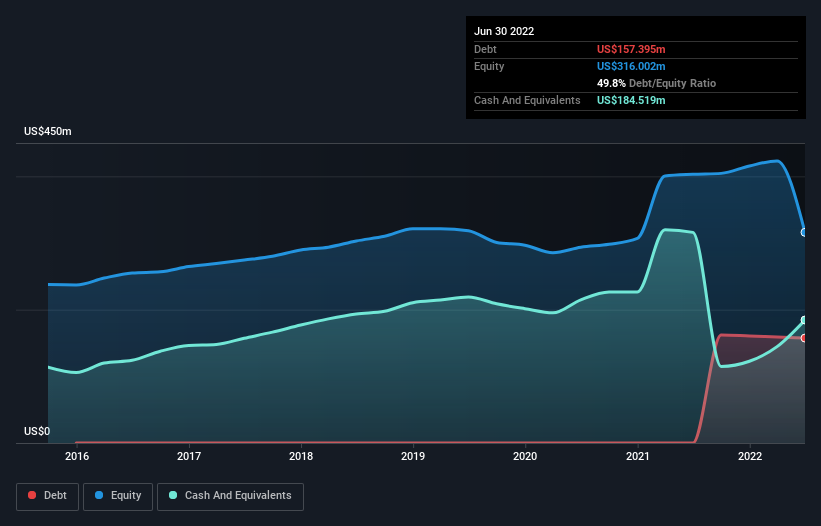Here's Why American Public Education (NASDAQ:APEI) Can Manage Its Debt Responsibly
Warren Buffett famously said, 'Volatility is far from synonymous with risk.' When we think about how risky a company is, we always like to look at its use of debt, since debt overload can lead to ruin. Importantly, American Public Education, Inc. (NASDAQ:APEI) does carry debt. But is this debt a concern to shareholders?
What Risk Does Debt Bring?
Debt and other liabilities become risky for a business when it cannot easily fulfill those obligations, either with free cash flow or by raising capital at an attractive price. If things get really bad, the lenders can take control of the business. However, a more frequent (but still costly) occurrence is where a company must issue shares at bargain-basement prices, permanently diluting shareholders, just to shore up its balance sheet. Of course, plenty of companies use debt to fund growth, without any negative consequences. The first thing to do when considering how much debt a business uses is to look at its cash and debt together.
View our latest analysis for American Public Education
What Is American Public Education's Debt?
The image below, which you can click on for greater detail, shows that at June 2022 American Public Education had debt of US$157.4m, up from none in one year. However, its balance sheet shows it holds US$184.5m in cash, so it actually has US$27.1m net cash.
How Strong Is American Public Education's Balance Sheet?
Zooming in on the latest balance sheet data, we can see that American Public Education had liabilities of US$95.1m due within 12 months and liabilities of US$251.0m due beyond that. Offsetting this, it had US$184.5m in cash and US$31.6m in receivables that were due within 12 months. So it has liabilities totalling US$130.0m more than its cash and near-term receivables, combined.
While this might seem like a lot, it is not so bad since American Public Education has a market capitalization of US$235.4m, and so it could probably strengthen its balance sheet by raising capital if it needed to. But it's clear that we should definitely closely examine whether it can manage its debt without dilution. While it does have liabilities worth noting, American Public Education also has more cash than debt, so we're pretty confident it can manage its debt safely.
American Public Education grew its EBIT by 3.5% in the last year. Whilst that hardly knocks our socks off it is a positive when it comes to debt. The balance sheet is clearly the area to focus on when you are analysing debt. But ultimately the future profitability of the business will decide if American Public Education can strengthen its balance sheet over time. So if you're focused on the future you can check out this free report showing analyst profit forecasts.
Finally, a company can only pay off debt with cold hard cash, not accounting profits. While American Public Education has net cash on its balance sheet, it's still worth taking a look at its ability to convert earnings before interest and tax (EBIT) to free cash flow, to help us understand how quickly it is building (or eroding) that cash balance. Over the last three years, American Public Education actually produced more free cash flow than EBIT. That sort of strong cash generation warms our hearts like a puppy in a bumblebee suit.
Summing Up
Although American Public Education's balance sheet isn't particularly strong, due to the total liabilities, it is clearly positive to see that it has net cash of US$27.1m. And it impressed us with free cash flow of US$37m, being 115% of its EBIT. So we don't have any problem with American Public Education's use of debt. Of course, we wouldn't say no to the extra confidence that we'd gain if we knew that American Public Education insiders have been buying shares: if you're on the same wavelength, you can find out if insiders are buying by clicking this link.
At the end of the day, it's often better to focus on companies that are free from net debt. You can access our special list of such companies (all with a track record of profit growth). It's free.
Have feedback on this article? Concerned about the content? Get in touch with us directly. Alternatively, email editorial-team (at) simplywallst.com.
This article by Simply Wall St is general in nature. We provide commentary based on historical data and analyst forecasts only using an unbiased methodology and our articles are not intended to be financial advice. It does not constitute a recommendation to buy or sell any stock, and does not take account of your objectives, or your financial situation. We aim to bring you long-term focused analysis driven by fundamental data. Note that our analysis may not factor in the latest price-sensitive company announcements or qualitative material. Simply Wall St has no position in any stocks mentioned.
Join A Paid User Research Session
You’ll receive a US$30 Amazon Gift card for 1 hour of your time while helping us build better investing tools for the individual investors like yourself. Sign up here

